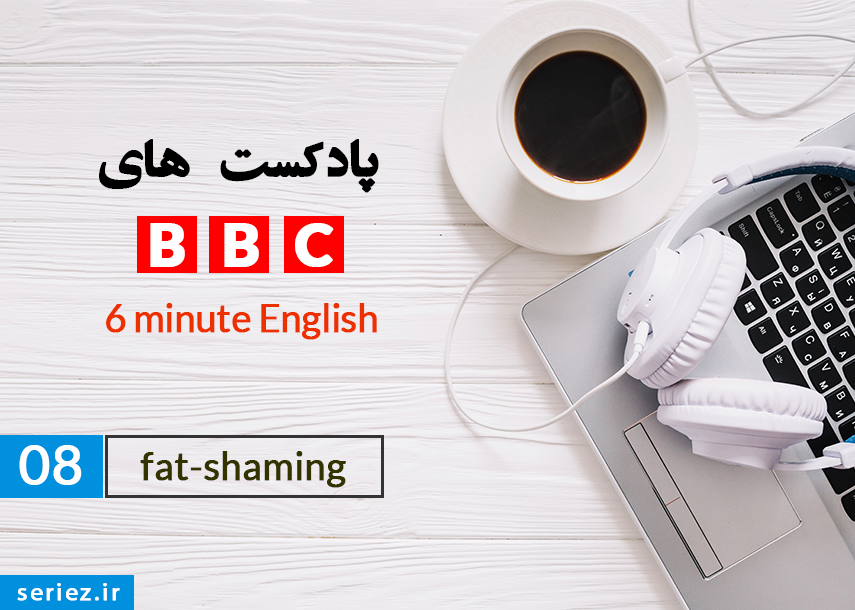پادکست های BBC 6 minute English – fat-shaming

قسمت هشتم پادکست های BBC 6 Minute English
در بخش هشتم پادکست های ۶ دقیقه ای بی بی سی، 6 لغت مهم با محوریت موضوع fat-shaming (تحقیر افراد چاق) بررسی می شود.
- ابتدا پادکست را بدون متن گوش کنید.
- آن را دوباره به همراه متن گوش دهید و
- در مرحله آخر لغات آن را مرور کنید.
پادکست شماره 8 (fat-shaming)
fat-shaming تحقیر کسی به دلیل چاق بودن
Ex: she refuses to resort to extreme dieting because of fat-shaming bullies
از رژیم گرفتن خودداری میکنه به خاطر اون قلدرهایی که چافیش رو مسخره می کنند.
obese بسیار چاق
Ex: Being obese and lazy is dangerous to health.
چاق و تنبل بودن برای سلامتی خطرناکه.
coin (a word or phrase) (به ویژه در مورد واژه و اصطلاح) ساختن
Ex: The word “smog” was coined by combining the words “smoke” and “fog.”
واژه smog “مه دود” از ترکیب واژه های smoke “دود” و fog “مه” ساخته شده است..
moral fibre قدرت درونی یا اراده درونی
Ex: The poet lived in an age that lacked moral fibre.
شاعر در عصری زندگی می کرد که مردمش اراده درونی کافی نداشتند.
attribute ویژگی،مشخصه
Ex: Patience is an essential attribute for a teacher.
صبر، مشخصه ضروری برای هر معلمی است.
scorn تحقیر
Ex: their scorn for the traitor drove him to suicide
تحقیرهای آنان خائن را به خودکشی واداشت.
Neil
Hello. This is 6 Minute English from BBC Learning English. I’m Neil.
Georgina
And I’m Georgina.
Neil
January is often the time when people make New Year’s resolutions – things they want to start, or stop, doing in the new year. Have you made any resolutions for 2021, Georgina?
Georgina
Well, for a start, Neil, I’m definitely going on a diet! Over Christmas I really piled on the pounds with all that chocolate.
Neil
Yes! not to mention Christmas pudding! I’d already put on extra weight during lockdown, then even more over Christmas, so I definitely need to diet in 2021.
Georgina
It’s curious that we both made resolutions to lose weight, isn’t it! I mean, most people overeat a bit at Christmas, then diet in January.
Neil
What are you saying, Georgina? Do you think we’re worried people will call us fat?
Georgina
It wouldn’t be so surprising, Neil. After all incidents of fat-shaming are on the rise – that’s what it’s called when someone is criticised or humiliated for being fat.
Neil
In this programme we’ll be asking where the attitudes behind fat-shaming come from. We’ll be hearing how anti-fat attitudes are often implicit or unconscious.
Georgina
Hang on though, Neil. Having a second slice of Christmas cake is hardly the same as being fat, much less obese.
Neil
That’s true, Georgina. The word obese describes a person who’s very overweight, with a lot of body fat. It’s the term for a medical condition, measured using BMI or the body mass index. It’s on the rise in the UK. In fact, that’s my quiz question – how many adults in the UK are affected by obesity? Is it:
a) 1 in every 3 adults?,
b) 1 in every 4 adults? or,
c) 1 in every 5 adults?
Georgina
I’ll guess, b) 1 in every 4.
Neil
OK, we’ll find out the answer later. As you say, Georgina, the word obese has a very specific meaning. Here’s Professor Abigail Saguy talking about the term to BBC World Service’s The Why Factor. Listen out for when the word, obesity, started to be used:
Prof Abigail Saguy
The term obesity was coined in the middle of the 20th century as a concerted effort by medical doctors to say: this is a medical issue, one over which we have authority and expertise.
Georgina
Professor Saguy says the term obese was coined in the mid-1900s, meaning it was invented or first used in a particular way.
Neil
It originally meant an individual medical problem; something to be discussed between patient and doctor. But over time obese has become a term of discrimination and abuse.
Georgina
Psychology professor, Chris Crandall, has been involved in Harvard University’s implicit bias projects. Most famous for revealing racial prejudice, the tests also measure other kinds of biases, including weight.
Neil
Many of the beliefs we hold about other people are hidden from conscious awareness. So what goes through our mind, consciously or unconsciously, when we see very fat people? Here’s Professor Crandall speaking to BBC World Service’s The Why Factor:
Prof Chris Crandall
We tend to think, at least in the western world, of fat people as personal failures, as moral failures… People tend to think of fatness as an indicator of laziness, of over-indulgence, of a lack of moral fibre, an unwillingness to take hold of your own life. We, as everyday Americans and westerners in general, tend to think that it’s a personal attribute, it’s a thing that you do to yourself and as a result you are deserving of scorn.
Georgina
There is a commonly-held prejudice that fat people are responsible for their condition – because they’re lazy, greedy, or lacking in moral fibre – the ability or determination to behave ethically or with self-control.
Neil
In the west especially, being fat or overweight is thought of as a personal attribute – a quality, characteristic or feature that someone has. The idea is that fat people just are the way they are, and have no–one to blame but themselves: they should just exercise more or stop eating…
Georgina
This leads some to treat them with scorn – a strong feeling of contempt or disrespect.
Neil
In reality of course, weight isn’t just about individual choices. How fat you are is also determined by environment and genetics – up to 80%, in some cases.
Georgina
And anyway, even if it was under personal control, fat-shaming doesn’t feel like the right way to help people lose weight.
Neil
So if it doesn’t cause problems, maybe you can have a second slice of cake after all, Georgina.
Georgina
Thanks Neil, but I don’t want to spoil my appetite for the quiz question you asked. Was I right about the number of UK adults affected by obesity?
Neil
What did you say, Georgina?
Georgina
I guessed, the answer was b) 1 in every 4 adults.
Neil
Which was… the correct answer! Fat is an issue affecting millions of adults in the UK alone, and with studies suggesting that obesity might be a negative factor linked to Covid 19, it’s one that could affect millions more.
Georgina
Food for thought there, Neil. Now, let’s recap the vocabulary, starting with obese – dangerously overweight as measured by the body mass index or BMI.
Neil
This term obesity was coined – or invented, to describe a medical condition, although many people nowadays consider it a personal attribute – a quality or characteristic.
Georgina
Fat-shaming is criticising and humiliating someone for being fat, or showing them scorn – feelings of contempt or disrespect.
Neil
Or it could also involve believing they lack moral fibre – the ability to behave correctly or with self-control.
Georgina
That’s all for this programme, but to find out more about your own implicit biases based on race, sexuality or weight, search online for ‘Harvard IAT’ and take a test yourself. You may be surprised what you find out!
Neil
And to hear more topical discussion and vocabulary join us again soon at 6 Minute English, download the app at your usual app store and follow us on social media. Bye for now!
Georgina
Bye!
حال می توانید به سوال های زیر پاسخ دهید:
- Have you made any resolutions for 2021?
- Are you worried that people call you fat?
جواب هاتون رو کامنت کنید…


دیدگاهتان را بنویسید
برای نوشتن دیدگاه باید وارد بشوید.